#he inhabited the body of a gay man and was so committed to the part he became gay
Text

#incorrect mdzs#mdzs#wei wuxian#wangxian#mxtx#mxtx mdzs#wei wuxian was the original method actor#he inhabited the body of a gay man and was so committed to the part he became gay
460 notes
·
View notes
Text
More Than Meets the Eye #33: In Which I Write the Word ‘Quantum‘ 19 Times
Dang, I forgot what happened at the end of the last issue. It was pretty important, too, but I don’t have time to reread. Maybe the establishing shot can help me out?
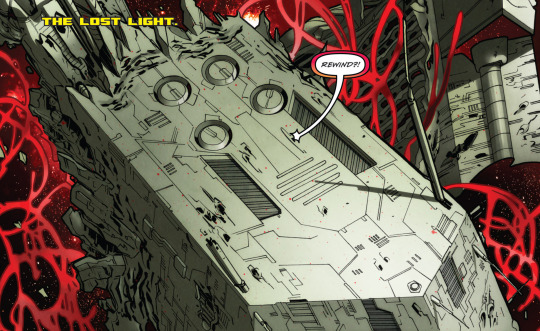
Oh, that’s right, Rewind happened!
Everyone’s pretty jazzed that Rewind is here, non-exploded, and supposedly alive. Megatron carries this ridiculously small man over to a table, while Skids is busy admonishing Nightbeat for trying to put the pieces of this mystery together.
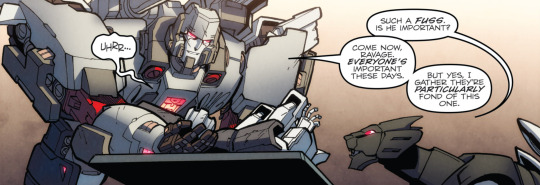
That’s one of the two first canonically, openly gay Transformers, Megatron. You bet your ass he’s important.
Nightbeat’s dragged Nautica over to look at that poster for Crosscut’s play they saw last issue. Together, they discover something interesting, and it’s not that Nightbeat’s chin has elongated to the point of absurdity. On this future ship, the play was completed and produced a mere few weeks after the initial launch of the Lost Light.
While this is going on, Rewind wakes up and asks Skids what the hell is going on. Skids, likely not wanting to poke at farm-fresh trauma, glosses over the fact that everyone on this ship was violently murdered, and that they found Rewind blacked out inside the hollowed torso of his brother-in-law.
…This is a dark story line.
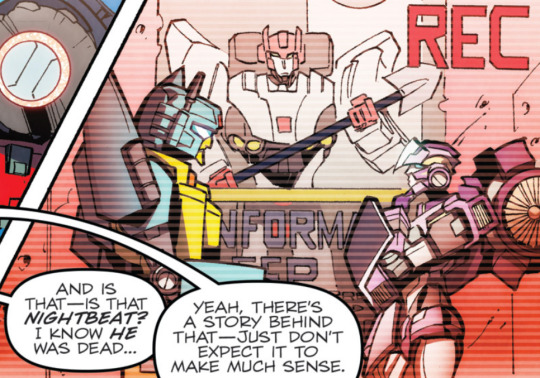
You see, the joke here is that “Dark Cybertron” sucked major chrome.
Megatron reminds everyone that they’re still in grave danger every moment they stay aboard this ship, but Skids is more concerned with Rewind’s mental health. Which is sweet, but maybe not the thing to prioritize in such a precarious situation.
Rewind takes the fact that Megatron is an Autobot now pretty friggin’ well, as well as the introduction of gender into his species. That is, until Nightbeat, the king of social graces, saunters up to the scene to ask Rewind what the hell happened to the ship. He does get his answers, despite Rewind being horrified to the point of speechlessness.
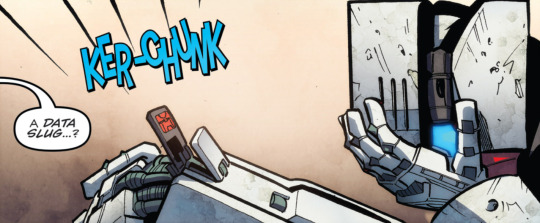
Over at the hole in the wall, Nautica and Riptide are taking a gander at the quantum drums, which house the quantum foam for the quantum engines so quantum jumps can happen.
As Nautica explains the process by which quantum travel works, she realizes that the answer to what happened to everyone who disappeared was right in front of them this whole time.
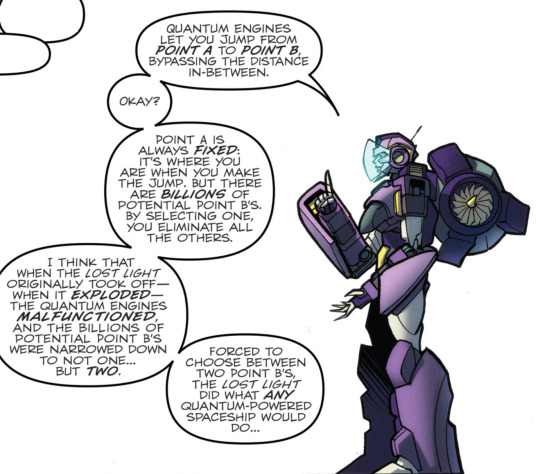

Quantum, quantum, quantum- doesn’t even sound like a word anymore, does it?
The data slug Rewind made corroborates this theory, showing a series of events that definitely didn’t happen to the Lost Light we’ve been following throughout this story so far. The data slug contains this Rewind’s version of dead Rewind’s “Little Victories”, the travelogue that was never completed, where the question “are you happy?” revealed just how emotionally unhealthy most of the crew is. I’d like to imagine this Rewind’s film is called “Small Achievements”, or perhaps “Dear Fucking Lord, We’ve Been on this Trip for Three Hours and the Captain Has Been Killed by a Goddamned Soul-Vampire”, or maybe even “Where the FUCK is Our Therapist”.
The DJD came into the equation by way of someone having led them to the Lost Light. We get a flashback panel of the gorefest, in which Tarn appears to have learned how to fly, given the angle he’s coming from.
Because Rewind’s big thing in this series is being the guy who records stuff, the DJD take the opportunity to make some movies of their visit to the space yacht.

James, why do you keep getting Rewind involved with snuff films? I’m starting to get concerned.
Now, the thing about Rewind is that he’s almost always accompanied by his other half. Where is Chromedome, anyway?
He’s dead, that’s where.
Turns out, when you tell the DJD that you won’t do the thing they want you to do, they have a habit of doing nasty things in retaliation. Chromedome got stabbed in the friggin’ visor with his own finger needles, because Vos enjoys ironic deaths, I suppose. There’s some other stuff that’s implied to have happened, but we’ll get to that once we learn a little more about the DJD themselves.
While Rewind recounts the grisly tale of his husband’s demise, Riptide notes that the quantum foam has begun to spread at a remarkable rate. This is a bad thing, because that shit can and will explode, given half the chance, and this wreck is floating right above a potentially-inhabited planet.
Though I could have sworn we established that this planet was a Smartplanet, and therefore very much populated by students and staff. I don’t know. Maybe we conveniently forgot that, so we could make this a learning moment for Megatron.
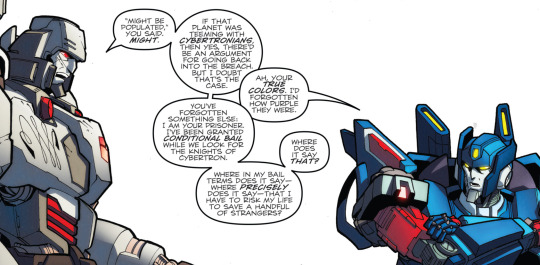
Jiminy Christmas, Megs, do you even listen to yourself?
Skids, who has had a very long day of finding corpses and learning about quantum theory, snaps at Megatron, telling him that in order to actually be an Autobot, you have to have a little frickin’ compassion for those outside of your peer group.
Which is sort of contradictory to the Aequitas trials, the Killswitch debacle, the POW situation back on Cybertron, and whatever the fuck Prowl’s whole deal is, but maybe Skids is speaking about his own, personal relationship with being an Autobot. Hopefully so, otherwise he needs a class on critical thinking, STAT.
Never mind all of that though, because the problem just got a lot worse- the quantum foam has expanded to a point where any holes in the stuff are too small for the Rod Pod to get through. We’re going to have to get creative if we want to save the day.
Luckily, we’ve got a quantum duplicate of just about the tiniest little dude in the franchise here to do the job. Now we just need another, equally tiny little man, so the quantum drums can be shut off at the same time. Nautica commits more microaggressions, and this gives Getaway inspiration for a witty quip, which in turn gives Skids a brilliant idea.
The gang heads down to Brainstorm’s lab, to look for the mass displacement gun that was used for treating Ultra Magnus’s nanocon infestation back in the 2012 Annual. While they search, Nautica explains just why the hell the Lost Light disappeared in the first place. You see, quantum duplication acts on the Cain Instinct— it’s fine, as long as the duplicates don’t perceive each other. However, the moment contact is made, it says “oh man, guess I’m gonna have to end you” to one of the duplicates. The contact in this case happened when the Coffin Rodimus was brought aboard the ship.
Anything that wasn’t aboard the Lost Light at the point of the takeoff/explosion was never duplicated, and thus wasn’t erased from reality once shit started going to hell. This is why the Rod Pod is still around, and why the remaining cast are— well, the remaining cast.
While this conversation is going on, Nautica and Nightbeat uncover yet another dead body; it’s Brainstorm, and he’s a little underdressed.
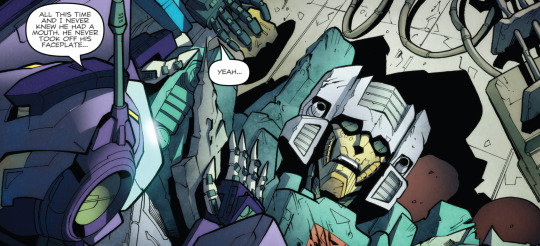
…Someone run a paternity test, I think Cyclonus might be the father.
Also, Brainstorm’s a double agent.
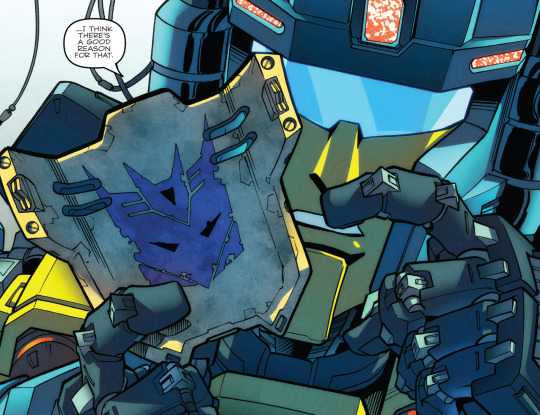
Fucked up.
Getaway is furious that a Decepticon has been living on the same ship as him for the last six months, right under his proverbial nose. Even Megatron’s surprised, stating that Brainstorm isn’t usually who the recruiters aim for.
So, no mass displacement gun, and now they’re aware of the fact that there’s a traitor on the ship who’s had access to a LOT of weapon tech. It’s at this point that Megatron decides to stop lying by omission and tells everyone that he can mass-displace, since he used to turn into a handgun.
Smashcut to Megatron and Rewind floating out in space, the former now not much taller than the latter, as they traverse the web of quantum foam to get to the drums. Nautica instructs them from the Rod Pod. If this works, anything produced or connected to the quantum engine will be neutralized, and maybe we’ll even get the other Lost Light back! YAAAAAY!!!
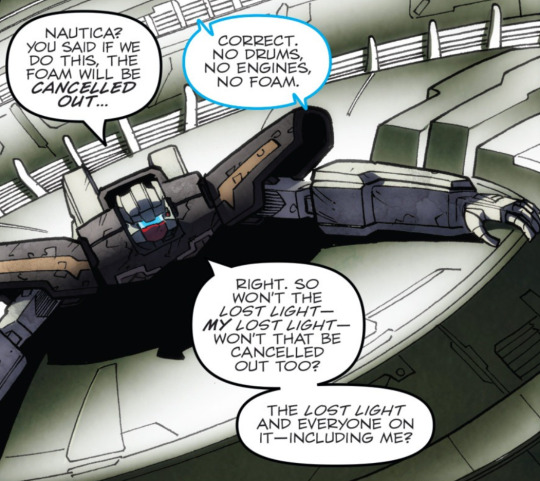
Y’all really let this man go out there to fuckin’ kill himself for the greater good, didn’t you?
Rewind is honestly pretty chill with ceasing to be, seeing as he watched 200/+ people die today, including his long-time spouse.
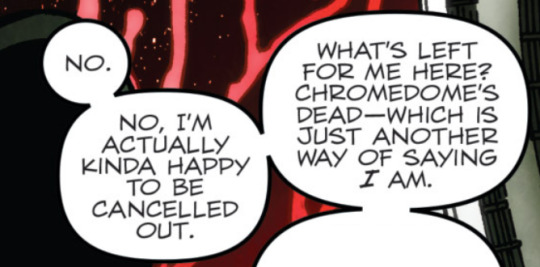
Jesus. I’d say get him a therapist, but in order to do that, we’re going to have to wipe him off the map anyway.
Rewind asks Megatron if the Chromedome that isn’t his and his duplicate are still together. And I mean…
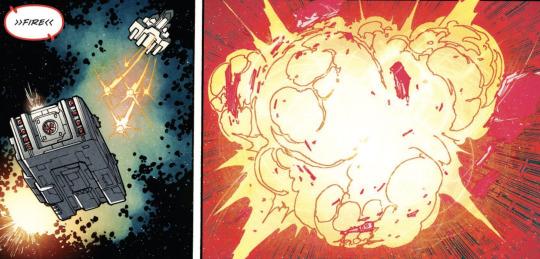
Luckily, Megatron has the good sense to lie.
With that, they flip the switches, and deactivate the drums.

And that’s a series wrap on Rewind! Congrats to Mr. James Roberts for the esteemed honor of burying the same gay twice!
Later on, everyone is back inside the Rod Pod, as their disappeared shipmates return from being nonexistent. Chromedome pops back in, and Skids is on him like a shark, telling him to go on the roof. Skids doesn’t even try to explain why. Which, fair. How the hell do you explain to someone that their dead husband’s quantum duplicate survived both a terrorist splinter cell attack, and the laws of quantum sci-fi bullshit crashing down on his tiny, tiny body, and that he’s right there on the roof waiting for them?
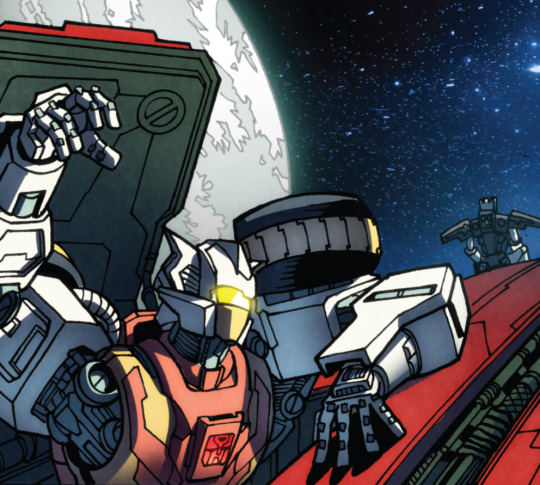
Welp, there goes the Chromedome/Dominus endgame. Shame, that.
Looks like Chromedome finally hit the threshold for having earned Roberts’ pity, and won’t be directly targeted by the plot for a little while. This isn’t something you see very often, so let’s really soak this in.

…Someone had to have told Rewind what happened to the other Rewind, right? I wonder what that conversation was like.
Back inside the ship, Blaster gets word that the Lost Light has reappeared. As they navigate towards it, Megatron requests that an encrypted call be made to Rodimus, to discuss the Brainstorm problem.
In the interim, Ravage is offered the opportunity to be a part of the crew, so he doesn’t have to keep skulking around in the shadows. We don’t get an answer from him, as our focus shifts over to Nightbeat and Nautica.
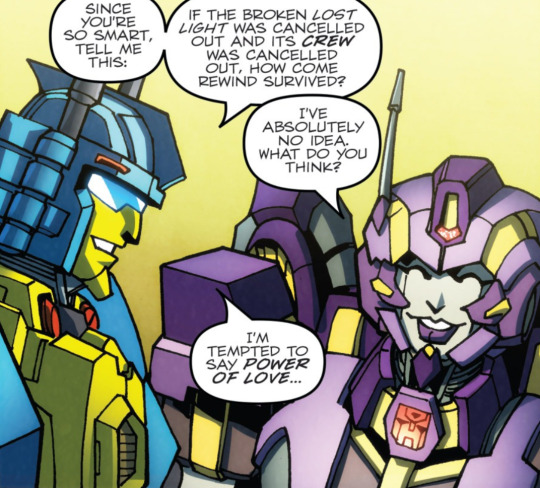
Nightbeaaaaaaaaaat, stop stating the themes of the comic verbatim! People are going to start thinking you’re a shonen anime protagonist!
Nightbeat’s somehow managed to keep ahold of the briefcase that they found on the other Lost Light. Unless Brainstorm’s boyfriend is in there, I don’t think this one was the work of Huey Lewis and the News’ hit single from the Back to the Future soundtrack.
Over on the Lost Light, specifically in Swerve’s, Brainstorm’s making his way through the crowd, briefcase held gentle like hamburger as he goes. He makes it to the bar, where Atomizer tells him he can’t have his briefcase in here. Brainstorm has what most would accept to be a healthy response to being told “no.”
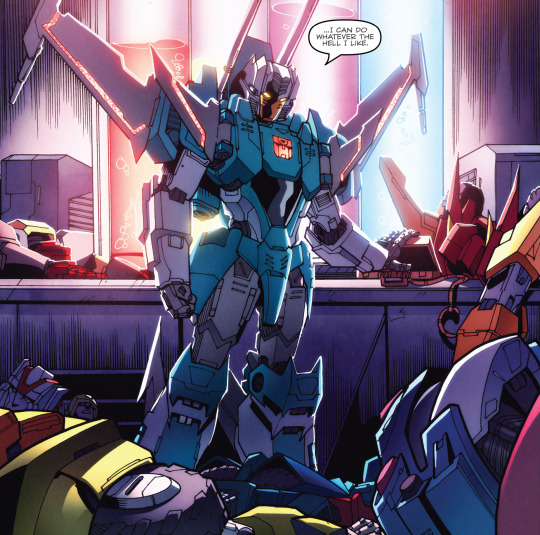
It’s what I would do.
#transformers#jro#MTMTE#slaughterhouse#issue 33#maccadam#Hannzreads#text post#long post#comic script writing
207 notes
·
View notes
Text
Murder in the Bible
The act of murder is rampant in the Bible. In much of the Bible, especially the Old Testament, there are laws that command that people be killed for absurd reasons such as working on the Sabbath, being gay, cursing your parents, or not being a virgin on your wedding night. In addition to these crazy and immoral laws, there are plenty of examples of God’s irrationality by his direct killing of many people for reasons that defy any rational explanation such as killing children who make fun of bald people, and the killing of a man who tried to keep the ark of God from falling during transport. There are also countless examples of mass murders commanded by God, including the murder of women, infants, and children.
The following passages are a very small percentage of the total passages approving of murder in the Bible. They are divided here into three parts: 1) Capital Punishment Crimes, 2) God’s Murders for Stupid Reasons, 3) Murdering Children, and 4) Miscellaneous Murders. This list is long, but it barely scratches the surface of all the murders approved of in the Bible.
1) Capital Punishment Crimes:
Kill People Who Don’t Listen to Priests
Anyone arrogant enough to reject the verdict of the judge or of the priest who represents the LORD your God must be put to death. Such evil must be purged from Israel. (Deuteronomy 17:12 NLT)
Kill Witches
You should not let a sorceress live. (Exodus 22:17 NAB)
Kill Homosexuals
“If a man lies with a male as with a women, both of them shall be put to death for their abominable deed; they have forfeited their lives.” (Leviticus 20:13 NAB)
Kill Fortunetellers
A man or a woman who acts as a medium or fortuneteller shall be put to death by stoning; they have no one but themselves to blame for their death. (Leviticus 20:27 NAB)
Death for Hitting Dad
Whoever strikes his father or mother shall be put to death. (Exodus 21:15 NAB)
Death for Cursing Parents
1) If one curses his father or mother, his lamp will go out at the coming of darkness. (Proverbs 20:20 NAB)
2) All who curse their father or mother must be put to death. They are guilty of a capital offense. (Leviticus 20:9 NLT)
Death for Adultery
If a man commits adultery with another man’s wife, both the man and the woman must be put to death. (Leviticus 20:10 NLT)
Death for Fornication
A priest’s daughter who loses her honor by committing fornication and thereby dishonors her father also, shall be burned to death. (Leviticus 21:9 NAB)
Death to Followers of Other Religions
Whoever sacrifices to any god, except the Lord alone, shall be doomed. (Exodus 22:19 NAB)
Kill Nonbelievers
They entered into a covenant to seek the Lord, the God of their fathers, with all their heart and soul; and everyone who would not seek the Lord, the God of Israel, was to be put to death, whether small or great, whether man or woman. (2 Chronicles 15:12-13 NAB)
Kill False Prophets
If a man still prophesies, his parents, father and mother, shall say to him, “You shall not live, because you have spoken a lie in the name of the Lord.” When he prophesies, his parents, father and mother, shall thrust him through. (Zechariah 13:3 NAB)
Kill the Entire Town if One Person Worships Another God
Suppose you hear in one of the towns the LORD your God is giving you that some worthless rabble among you have led their fellow citizens astray by encouraging them to worship foreign gods. In such cases, you must examine the facts carefully. If you find it is true and can prove that such a detestable act has occurred among you, you must attack that town and completely destroy all its inhabitants, as well as all the livestock. Then you must pile all the plunder in the middle of the street and burn it. Put the entire town to the torch as a burnt offering to the LORD your God. That town must remain a ruin forever; it may never be rebuilt. Keep none of the plunder that has been set apart for destruction. Then the LORD will turn from his fierce anger and be merciful to you. He will have compassion on you and make you a great nation, just as he solemnly promised your ancestors. “The LORD your God will be merciful only if you obey him and keep all the commands I am giving you today, doing what is pleasing to him.” (Deuteronomy 13:13-19 NLT)
Kill Women Who Are Not Virgins On Their Wedding Night
But if this charge is true (that she wasn’t a virgin on her wedding night), and evidence of the girls virginity is not found, they shall bring the girl to the entrance of her fathers house and there her townsman shall stone her to death, because she committed a crime against Israel by her unchasteness in her father’s house. Thus shall you purge the evil from your midst. (Deuteronomy 22:20-21 NAB)
Kill Followers of Other Religions.
1) If your own full brother, or your son or daughter, or your beloved wife, or you intimate friend, entices you secretly to serve other gods, whom you and your fathers have not known, gods of any other nations, near at hand or far away, from one end of the earth to the other: do not yield to him or listen to him, nor look with pity upon him, to spare or shield him, but kill him. Your hand shall be the first raised to slay him; the rest of the people shall join in with you. You shall stone him to death, because he sought to lead you astray from the Lord, your God, who brought you out of the land of Egypt, that place of slavery. And all Israel, hearing of this, shall fear and never do such evil as this in your midst. (Deuteronomy 13:7-12 NAB)
2) Suppose a man or woman among you, in one of your towns that the LORD your God is giving you, has done evil in the sight of the LORD your God and has violated the covenant by serving other gods or by worshiping the sun, the moon, or any of the forces of heaven, which I have strictly forbidden. When you hear about it, investigate the matter thoroughly. If it is true that this detestable thing has been done in Israel, then that man or woman must be taken to the gates of the town and stoned to death. (Deuteronomy 17:2-5 NLT)
Death for Blasphemy
One day a man who had an Israelite mother and an Egyptian father got into a fight with one of the Israelite men. During the fight, this son of an Israelite woman blasphemed the LORD’s name. So the man was brought to Moses for judgment. His mother’s name was Shelomith. She was the daughter of Dibri of the tribe of Dan. They put the man in custody until the LORD’s will in the matter should become clear. Then the LORD said to Moses, “Take the blasphemer outside the camp, and tell all those who heard him to lay their hands on his head. Then let the entire community stone him to death. Say to the people of Israel: Those who blaspheme God will suffer the consequences of their guilt and be punished. Anyone who blasphemes the LORD’s name must be stoned to death by the whole community of Israel. Any Israelite or foreigner among you who blasphemes the LORD’s name will surely die. (Leviticus 24:10-16 NLT)
Kill False Prophets
1) Suppose there are prophets among you, or those who have dreams about the future, and they promise you signs or miracles, and the predicted signs or miracles take place. If the prophets then say, ‘Come, let us worship the gods of foreign nations,’ do not listen to them. The LORD your God is testing you to see if you love him with all your heart and soul. Serve only the LORD your God and fear him alone. Obey his commands, listen to his voice, and cling to him. The false prophets or dreamers who try to lead you astray must be put to death, for they encourage rebellion against the LORD your God, who brought you out of slavery in the land of Egypt. Since they try to keep you from following the LORD your God, you must execute them to remove the evil from among you. (Deuteronomy 13:1-5 NLT)
2) But any prophet who claims to give a message from another god or who falsely claims to speak for me must die.’ You may wonder, ‘How will we know whether the prophecy is from the LORD or not?’ If the prophet predicts something in the LORD’s name and it does not happen, the LORD did not give the message. That prophet has spoken on his own and need not be feared. (Deuteronomy 18:20-22 NLT)
Infidels and Gays Should Die
So God let them go ahead and do whatever shameful things their hearts desired. As a result, they did vile and degrading things with each other’s bodies. Instead of believing what they knew was the truth about God, they deliberately chose to believe lies. So they worshiped the things God made but not the Creator himself, who is to be praised forever. Amen. That is why God abandoned them to their shameful desires. Even the women turned against the natural way to have sex and instead indulged in sex with each other. And the men, instead of having normal sexual relationships with women, burned with lust for each other. Men did shameful things with other men and, as a result, suffered within themselves the penalty they so richly deserved. When they refused to acknowledge God, he abandoned them to their evil minds and let them do things that should never be done. Their lives became full of every kind of wickedness, sin, greed, hate, envy, murder, fighting, deception, malicious behavior, and gossip. They are backstabbers, haters of God, insolent, proud, and boastful. They are forever inventing new ways of sinning and are disobedient to their parents. They refuse to understand, break their promises, and are heartless and unforgiving. They are fully aware of God’s death penalty for those who do these things, yet they go right ahead and do them anyway. And, worse yet, they encourage others to do them, too. (Romans 1:24-32 NLT)
Kill Anyone who Approaches the Tabernacle
For the LORD had said to Moses, ‘Exempt the tribe of Levi from the census; do not include them when you count the rest of the Israelites. You must put the Levites in charge of the Tabernacle of the Covenant, along with its furnishings and equipment. They must carry the Tabernacle and its equipment as you travel, and they must care for it and camp around it. Whenever the Tabernacle is moved, the Levites will take it down and set it up again. Anyone else who goes too near the Tabernacle will be executed.’ (Numbers 1:48-51 NLT)
Kill People for Working on the Sabbath
The LORD then gave these further instructions to Moses: ‘Tell the people of Israel to keep my Sabbath day, for the Sabbath is a sign of the covenant between me and you forever. It helps you to remember that I am the LORD, who makes you holy. Yes, keep the Sabbath day, for it is holy. Anyone who desecrates it must die; anyone who works on that day will be cut off from the community. Work six days only, but the seventh day must be a day of total rest. I repeat: Because the LORD considers it a holy day, anyone who works on the Sabbath must be put to death.’ (Exodus 31:12-15 NLT)
47 notes
·
View notes
Text
The Raven Boys, Chapter 4
Gansey had once told Adam that he was afraid most people didn’t know how to handle Ronan. What he meant by this was that he was worried that one day someone would fall on Ronan and cut themselves.
I love this so much, not least because I am very biased for Ronan right now and he just... like [Gansey] was worried that one day someone would fall on Ronan and cut themselves. Like wow, poetry in motion and double meanings. Why am I sensing a Ronan/Adam vibe here?
I mean, I was about to skip over it but: Believing in the supernatural, tolerating Gansey’s troubled relationship with money, and co-existing with Gansey’s other friends. The former two were problematic only when they took time away from Aglionby, and the latter was only problematic when it was Ronan Lynch. There’s definitely something about Ronan and Adam together? Adam seems very much like the guy that also gets along with everyone else in a very distant polite way, except when Ronan Lynch brings out very true and undeniable genuine feelings in him (the good, the bad and especially the ugly).
Or maybe I’m just choosing my ship too soon.
Girlfriend, in fluttering white silk, looked a lot like Brianna, or Kayleigh, or whoever Declan’s last girlfriend had been. They all had blond, shoulder-length hair and eyebrows that matched Declan’s dark leather shoes.
I really don’t like Declan so far, just from the way Gansey and Ronan react to him and his propensity to switch girlfriends. Adam is also weirdly throwing me off here because we’re told that Declan’s lastest girlfriend’s name is Ashley but Adam is kinda insistent on just calling her Girlfriend in this very objectifying way?
He wasn’t quite sure how to put this feeling into concrete terms. It was a stare caught out of the corner of his eye, a set of scuffed footprints in the stairwell that didn’t seem to belong to any of the boys, a library clerk telling him an arcane text had been checked out by someone else right after he had returned it.
It wasn’t that Adam wondered if Declan was spying on them. Adam knew he was, but he believed that had everything to do with Ronan and nothing to do with the ley line. Still, it wouldn’t hurt to do a bit of observation.
Intriguing. So Adam is the Practical Friend, which I buy since he is very much a commoner in a high class surrounding that he’s not used to that he just has to notice everything.
Also, messed up brotherly relationship much? Resorting to spying?
Adam watched the way Declan’s lip barely brushed the bottom of Girlfriend’s earlobe as he spoke to her; he looked away just as Declan glanced up.
I don’t know why just this line makes me think that Adam is gay. The focus of this line is very much Declan’s lips doing intimate acts and Adam watching that (being gay) without being seen (outing himself).
Adam was very good at watching without being watched. Only Gansey ever seemed to catch him at it.
I just like the thought that Gansey is very observant and the reason why they’re such close friends. It also gives this other dimension to Gansey, that Adam may be the Practical Friend, but Gansey is not really the Oblivious Friend. Gansey only plays the Oblivious Due To Immense Focus On Other Important Stuff Friend because he can trust Adam to watch his back.
Not the tidy stacks of an intellectual attempting to impress, but the slumping piles of a scholar obsessed. Some of the books weren’t in English. Some of the books were dictionaries for the languages that some of the other books were in. Some of the books were actually Sports Illustrated Swimsuit Editions.
I love this type of characterization so much??? Especially Not the tidy stacks of an intellectual attempting to impress, but the slumping piles of a scholar obsessed.
Adam felt the familiar pang. Not jealousy, just wanting. One day, he’d have enough money to have a place like this. A place that looked on the outside like Adam looked on the inside.
Oh, Adam. Also, I can’t quite figure out what A place that looked on the outside like Adam looked on the inside means exactly. There’s lots of metaphors for me to parse out in this books, and we’re not even five chapters in.
Girlfriend held her hands to her chest in an unconscious reaction to masculine nakedness. In this case, the naked party was not a person, but a thing: Gansey’s bed, nothing but two mattresses on a bare metal frame, sitting baldly in the middle of the room, barely made. It was somehow intimate in its complete lack of privacy.
I do love the image of Gansey’s bed as an island in the sea of books and there’s something about it that speaks of his obsession, like he spent all those money on books that he could careless about the place he sleep in. Masculine nakedness, I’m not sure where that comes in. Ideas?
Adam was struck, as he occasionally was, by Gansey’s agelessness: an old man in a young body, or a young man in an old man’s life.
Adam’s really observant. I had a feeling of Gansey like that, but he describes it so well with his comparison.
There were two Ganseys: the one who lived inside his skin, and the one Gansey put on in the morning when he slid his wallet into the back pocket of his chinos. The former was troubled and passionate, with no discernible accent to Adam’s ears, and the latter bristled with latent power as he greeted people with the slippery, handsome accent of old Virginia money. It was a mystery to Adam how he could not seem to see both versions of Gansey at the same time.
I like it and I’m curious to see how the other slipper Gansey who is born in money acts.
He knocked fists with Adam. Coming from Gansey, the gesture was at once charming and self-conscious, a borrowed phrase of a another language.
Gansey and Adam, both charmingly awkward in speaking the other’s vernacular.
She glanced at Adam. Her eyes didn’t linger, but still, he remembered the fray on the shoulder of his sweater.
Don’t pick at it. She’s not looking at it. No one else notices it.
With effort, Adam squared his shoulders and tried to inhabit the uniform as easily as Gansey or Ronan.
Why, hello, Imposer Syndrome. I do really feel for Adam. This is such a nice detail to include. Also, mentions of Gansey and Ronan but not Noah? I’m very curious about the fourth member of their group now.
Ashley blinked vapidly, then said, "Sounds like a metaphor."
Perhaps she wasn’t as dumb as they’d thought.
Rude. Just because she’s with Declan?
He left out the part about how he believed the eternally sleeping Glendower would grant a favor to whoever woke him. He left out the part about how it haunted him, this need to find this long-lost king.
And the award for obsessiveness goes to none other than Gansey. Also, though, why? What favor does he need granted? Why is this need to find the long-lost king haunting him so much that it hurts?
Some days, some rotten days, Adam believed the former, and only barely. But being Gansey’s friend meant that more often he hoped for the latter. This was where Ronan, much to Adam’s dissatisfaction, excelled: His belief in the supernatural explanation was unwavering. Adam’s faith was imperfect.
And the barely disbelief feels like betrayal, in some ways, to Adam, when Gansey had reached out to him. I’m also getting a very opposite attracts vibe from Ronan and Adam. I think Adam’s faith is imperfect only because he is practical and believes very much in forging his own destiny like Blue. Ronan and Gansey have what Adam wants to have - money, power, connection -, sees that forging their own destiny isn’t really a thing even with those things, and so turn to the faith in supernatural.
Or so that’s what I think so far with the stuff that I’ve read. Maybe I’m reaching too much and later details will prove me wrong.
"That’s Noah," Declan said. He said it in a way that confirmed Adam’s assumption: Monmouth Manufacturing and the boys who lived in it were a tourist stop for Declan and Ashley, a conversation piece for a later dinner.
Why, just why? It’s like using a dog to start a conversation with a cute girl. Except now Declan dehumanize them to dogs and parade the boys around like clowns, turns around to his girlfriend with laughing eyes to say, “aren’t they just so strange?”
"Oh! Your hand is cold." Ashley cupped her fingers against her shirt to warm them.
"I’ve been dead for seven years," Noah said. "That’s as warm as they get."
I can just imagine Noah saying this in such a deadpan way that no one would know if he’s telling a joke or being serious.
Ronan and Declan Lynch were undeniably brothers, with the same dark brown hair and sharp nose, but Declan was solid where Ronan was brittle. Declan’s wide jaw and smile said, Vote for me while Ronan’s buzzed head and thin mouth warned that this species was poisonous.
"Ronan," Declan said. On the phone with Adam earlier, he had asked, When will Ronan not be available? "I thought you had tennis."
"I did," Ronan replied.
?? I thought Declan was gonna stop by when Ronan has class, not tennis. Also, the idea that Ronan is brittle fits oddly well, along with his appearance that warned he’s poison. I’m thinking about poisonous plants and self-protection via self-destruction, since the only way for Ronan to poison someone is for someone to take a bite out of him and harm him first.
As he pulled Ashley out into the tiny stairwell and down the stairs, Adam heard the beginnings of damage control: He has problems, I told you, I tried to make sure he wouldn’t be here, he’s the one who found Dad, it messed him up, let’s go get seafood instead, don’t you think we look like lobster tonight? We do.
I’m sorry and excuse me, what WTF? Wow, Declan, wow, really? Why did you even go there in the first place? Also, he’s the one who found Dad, it messed him up. Is this hinting that Ronan found their father’s dead body after he committed suicide or I was just obsessing too much about Kakashi and Sakumo recently?
I also just remembered there’s three of these brothers. I’m gonna assume Declan is the oldest if he holds the key to Ronan’s freedom (tho that seems odd to me seeing as how Declan doesn’t seem to quite able to hold Ronan’s leash at all, even in this short conversation), I’m wondering in a I-Don’t-Really-Want-To-Meet-Him-Way if the other brother’s just as bad.
Ronan’s expression was still incendiary. His code of honor left no room for infidelity, for casual relationships. It wasn’t that he didn’t condone them; he couldn’t understand them.
I can buy that, tho I’m wondering if Ronan is really only angry at Declan because Declane switches girlfriends a lot (hence the reference to infidelity) and does it really have nothing at all to do with the brothers’ tumult relationship or the fact that Declan seems to be constantly talking down at him and talking shit about him.
Ronan was not really Gansey’s problem, either, in Adam’s opinion, but they’d had this argument before.
I beg differ, Adam. When you’re friends, everyone is each other’s problem.
Ronan looked chastened, but Adam knew better. Ronan wasn’t sorry for his behavior; he was only sorry that Gansey had been there to see him.
Aww, interesting. From ‘I didn’t take notes for you because I thought you died in a ditch’ to ‘I’m sorry that you had to see this ugly side of me’.
But surely Gansey knew that as well as Adam. He ran his thumb back and forth across his bottom lip, a habit he never seemed to notice and Adam never bothered to point out. Catching Adam’s gaze, he said
Lips again. Like, when I write I have the tendency to over focus on the lips quirking, hand gesturing, eyes looking, but this is Adam looking at Gansey’s habit with his lips and just... never bothering to point it out and always very aware of it. But here’s also Gansey showing that he always knows more than he points out or lets on, like with Ronan and now Adam, since he catches Adam’s gaze as he looks.
Because of his money and his good family name, because of his handsome smile and his easy laugh, because he liked people and (despite his fears to the contrary) they liked him back, Gansey could’ve had any and all of the friends that he wanted. Instead he had chosen the three of them, three guys who should’ve, for three different reasons, been friendless.
Okay, it’s done. Everyone can go home now. This sums everything up about them so nicely that I’m just like let’s stay here forever. The story doesn’t need to go on. Let them be frozen in this period of youth and friendships despite odds.
Also, Gansey is obviously the center of their friendships so when he dies, I can just imagine all of the others breaking down and shattering in different ways and when that happens, all of them will cut each other with the sharp edges of their broken remains.
"I’m not coming," Noah said.
"Need some more alone time?" Ronan asked.
"Ronan," Gansey interjected. "Set your weapons to stun, will you? Noah, we won’t make you eat. Adam?"
More eccentricities. Why doesn’t Noah eat?
Also, Set your weapons to stun. That’s such an odd phrase to say, but coming from Gansey, it works? I also think here we see a bit of the other side of Gansey. When he comes out of his obsession long enough to bring his friends together, i think we can see a bit of the other side of Gansey that Adam mentions, the slippery side of Gansey that knows what he wants and knows exactly how to get it.
But Gansey and Adam sought Glendower for different reasons. Gansey longed for him like Arthur longed for the grail, drawn by a desperate but nebulous need to be useful to the world, to make sure his life meant something beyond champagne parties and white collars, by some complicated longing to settle an argument that waged deep inside himself.
Adam, on the other hand, needed that royal favor.
I... still don’t really get it? The more that’s revealed, the more befuddled I get.
Even though Ronan was snarling and Noah was sighing and Adam was hesitating, he didn’t turn to verify that they were coming. He knew they were. In three different ways, he’d earned them all days or weeks or months before, and when it came to it, they’d all follow him anywhere.
And their journey continues, this odd band of rich misfits. This chapter as a whole reminds me a bit of a fanfic analysis after everything said and done occurred.
8 notes
·
View notes
Text
Title: I hope the fact that I voted makes this an easier read 😬
By: Miliaku Nwabueze
Part One: Examine the Self
I was appalled at the cognitive dissonance in movement thinkers this summer. I witnessed “radical” organizers, activists, and thought leaders encourage members of the rebellion to channel their rage and frustration with state sanctioned violence into voting. Simply and unilaterally, “Vote!”, was the universally agreed upon call to action. Folks rarely identified whom to vote for or on what which ironically symbolizes the meaningless nature of their compulsing. The investment into state infrastructure puzzled me.
Organizations and individuals that do land acknowledgements before meetings know whose territory they’re on, but insist on realizing freedom through participating in state systems of governance that further solidify the state’s occupation. I’m not feeling that folks can legitimately have a decolonial or anti-coloniality orientation while they are actively advocating for voting and other methods of change-making that involve the state over autonomous, localized, and collective organization of meeting human needs: the commons.
The work of feminist scholars such as Donna Haraway, Patricia Hill Collins, Nancy Hartsock and others teach us that we know our world from what identity-as-spaces we occupy. Marginalized people have insight to build consciousness about their worlds and their oppressor’s because their positionality within them is defined in relationship to the violences of structural hegemony (i.e. woman to man, colonized to colonizer/settler, undocumented to citizen, black to white, etc.). Mahmoud Keshavarz builds on this theory by asserting “One’s class gender and/or ethnicity shape [their] being, interactions and inhabitations in the world...”
Aspiring revolutionaries “often present themselves as being critical, political and radical yet, in practice, and by what they produce, remain innocent, neutral or, merely well-intentioned.” People trying to design existences different from our status quo consistently give way to reform. I feel this is because we have not collectively nor individually interrogated our cognitive dissonance. We have not killed the cops, the state, the capitalist, the oppressor, the aspiring winner in our own heads. We have treated the means of allowing for the emergence of generative deviations from our trajectory of global, ecological collapse as somehow separate from the ends. Kehavarz continues: “...designers cannot simply engage in such complicated issues without a complex political understanding of their own position in terms of gender, class and ethnicity as well as how the contemporary orders of capital and the bodies serving those orders are organised by dispersed material articulations such as passports, camps, and borders, all configured by design.” Our failures to develop self awarness are the precursors to reform.
Part Two: “We Want to Do More Than Survive”: Self Examination
As Imani Scott-Blackwell penned so eloquently in a Facebook status about the 2020 Presidential election:
“While y’all mourn the results, I’ll continue grieving the fact that rather than using our resources, time, and talents to fortify local mutual aid networks that can sustain and protect us regardless of who the elected official are, we instead put that into elections, pamphlets, yard signs, social media tech company coffers, Halloween candy and snacks for the sake of “voter outreach”.
……
I’m really just confused like what are we actually doing.....what is it we actually want? Because impact > intent and we seem collectively committed to the wrong solutions and though I do see people that are critical of electoral politics few seem ready to talk about what we really need to do here.....divest from electoral politics all together.”
The amount of people encouraging other people to vote this year was historic. In my personal experiences, strangers with my private information texted and called me, knocked on my door, and hand wrote me letters urging me to engage in the spectacle of emergency voting. In meetings with grassroots and change-oriented organizations, people are doing land acknowledgments, and discussing indigenous sovereignty. These same meetings that begin with land acknowledgement often ended in encouraging attendees to vote.
But, aren’t the state and its power inherently colonial? So how does a strategy that envisions freedom and/or sovereignty for black, incarcerated, indigenous, and/or undocumented people include actions that codify state hegemony?
The first type of cognitive dissonance that “hit me in the head” was W.E.B DuBois’ Double consciousness in high school; in an English class with the only black teacher. It applied so directly to my experiences as a working class black girl packaged and scholar-shipped into a wealthy, predominantly white private school with a college acceptance rate of 100%. I took so much pride in this despite constantly having to be “twice as good to get half as much”. I spent so much time explaining I tested into Detroit Country Day, that I wasn’t there because I was good at sports. I spent so much time laughing on the outside while crying on the inside at insensitive jokes and comments. I spent so much time embarrassed by being dropped off in my father’s rumbling work van. Upon understanding W.E.B DuBois’ theory I realized all that time was wasted. I made an instantaneous shift in my consciousness. Learning about my positionality disrupted how I speculated my future.
In becoming aware of my own cognitive dissonance I was able to immediately re-imagine myself off of the trajectory of becoming a black femme agent of white supremacy. I leaned into my queerness, I continued to wear my hair as it grew out of my head, I defended myself and others against racism, and became increasingly disinterested with seeking the approval of my white classmates. One might have seen a Condeleeza Rice as my future, but I became an unemployed, overworked, weed-smoking, mushroom tripping (okay, only like twice), hippie dippie black abolitionist, gay ass radical. I changed my belief system and praxis to incorporate what I was learning about myself in relationship to the structures that dominate our lives, and the trajectory of my life was disrupted.
Part Three: The Theory
Again, can we who believe in freedom from US hegemony have a decolonial orientation while encouraging engagement in state infrastructures? Is channeling mass frustration with state violence into voting a decolonial framework? I ask, declaratively. Decolonization is a speculative disruption and a deviation from the trajectory laid out before us, requiring the abolition of the state. I believe this is an issue with speculative design - it’s failure to disrupt our thinking and how we might imagine life after now.
Professor Jamer Hunt at The New School once summarized a point by Arjun Appadurai from his piece “Disjuncture and Difference in the Global Economy”: “We lean on sameness, really, to understand if we’re doing things right.” We do this in the most mundane of ways. If you got the same answer as me then I must have gotten it right! Right?... In her iconic work, “The Master’s Tools will Never Dismantle The Master’s House,” Audre Lorde teaches us difference is a practice of discovery. However, we respond to differences -not the status quo as difference within marginal contexts- as if it's a disruption. As a deviation in need of discipline. We then, sometimes, rely on our conceptions of hierarchy to determine “rightness”: young over old, literally any racial-ethnic identity over black, teacher over student, man over woman, etc.
Sameness can build a nation. Appadurai asserts a nation is a set of communities based on shared cultural values. In the US that culture is whiteness. That is the “nation” in the “nation-state” on Turtle Island. The dash is the “articulatory” piece. “Nation” and “state” were intentionally intertwined and can be separated and destroyed.
The job of the “state” in “nation-state” is to spread itself. Colonization (direct and indirect) is what makes/made this possible; coloniality is what makes it enduring. After all, a state is simply a condition or what “is”, and white supremacy is what articulates and unifies this being. Therefore, one can only conclude that on turtle island, the “United” “States” is the product of spreading white supremacy in all shapes and fashions, enduringly. This has shaped identity, positionalities, and mobilities and thus speculative design(ers). Statist thinking is thwarting possibility and distorting it into limited likelihoods. This is a trap door to reform. This is where decolonization, returning land to the not only indigenous people, but indengous life--the commons--is transformed into a metaphor to live in infinite land acknowledgements and celebratory, meaningless court decisions. The endurance of the state’s illusory nature forces us to endure, feeling as though nothing will change nor end. Right? Nope, that’s not the answer I got.
In Design Politics: An Inquiry Into Passports, Camps and Borders the most fire book on design right now, Mahmoud Keshavarz asserts the non enduring nature of statehood: “The State is designed”. He says, “Refugee, settlers, displacement,” and I would add colonization and racism etc. is realized via statehood. Statehood will not be the liberating variable in these narratives as these positions are diametrically opposed to the ever demonstrating settler, colonial, capitalist, and violent interests of the nation-state.
Advocating for divestment from state infrastructures is unfamiliar, different, and possibly unsettling. Unsettling is our future state if there’s anything real behind your land acknowledgements. To summarize Yang and Tuck in Decolonization is Not a Metaphor: “What is unsettling about decolonization” is the literal unsettling. To “Unsettle” is to disrupt. As designers think about futures we must be aware of our standpoint, reorient, and think about what decolonization, anti-racism, undocumentedness, anti-capitalism, etc. wants - designing from this standpoint is where speculative disruption is born.
Part Four: Speculative Disruption
Speculative Disruption begins where reform ends. Speculation, unimaginatively, has become a practice of prediction. A space we’ve let our data-driven culture of determining likelihoods colonize (Lol, jk.) imagination in service of accuracy. We let our obsession with predicting outcomes, performing certainty, and being “right” be conflated with and distort possibility.
There’s a saying circulating around radical communities: “abandon the capitalist, king, and the economy to govern an empty house”. Designers can materialize the future right now. “...Zoom out and start with new realities (ways of organizing everyday life through alternative beliefs, values, priorities, and ideology) then develop scenarios and possibly personas to bring it to life (173)”
This is deeper than designing what we “want”. Folks love to metaphorize colonization in the following phrases: “decolonizing our desires” or “decolonize our minds” though I think they mean our thoughts have been co-opted by the enduring nature of the nation-state and reinforcing of sameness and correctness. What we want is influenced by what we want to destroy as evidenced by the cognitive dissonance rampant through change making institutions. “VOTE!” But “Police are bad”, “So we have to vote for the people who vow to hire them!” [I’m not making this up]. Or immigrants or black people who defend their piece of the settler pie while feeling “it’s a shame what happened to the ‘natives’”.
My friend Sasha once said we need to organize to make things possible and impossible. This is the speculative and disruptive process of designing the unfamiliar -- the being that does not replace what we have and is not an evolution of the existing. The word unfamiliar comes from the Latin and Old English words for servant and family, respectively. Humans need to prepare for freer worlds that don’t currently serve our present ways of thinking and that are non-proximal to us. The designs for free worlds will come from the wants of the subaltern who have consciously refused to endure. We need to design the abolitionist mechanisms that will make a commons possible while making the empire impossible.
Speculative disruption speculates the unsettling, the deviation from where we are headed and the orientation towards the directions in which we hope to journey. I ask declaratively: How can we learn to be okay with what is not familiar to us and how can we allow that which does not serve the current and dominant trajectory to inform what we create? How can we engage in a radically feminist practice of embracing uncertainty by acting without fear of consequences we are also uncertain of?
1 note
·
View note
Link
FX’s second American Crime Story entry could be far more accurately titled The Dissection of Andrew Cunanan.
But in the realm of readily recognizable names, that doesn’t ring many chimes. So it’s The Assassination of Gianni Versace, even though Cunanan is the driving force while two of his other younger victims -- there were five in all -- get fuller treatments than the iconic fashion designer.
Former Glee star Darren Criss inhabits Cunanan with more flash and impact than any model who ever wore one of Versace’s creations. He’s alternately chilling, pathetic, conniving and deluded without ever being visibly remorseful. It’s a fully committed, crazily energetic performance that carries this nine-part miniseries through its peaks, valleys and at times disjointed timeline. Assassination of Gianni Versace also is very nice to look at, except when the corpses left behind are not.
Ryan Murphy, lately the busiest man in Hollywood, again shows that he’s generally on firmer ground when dramatizing real-life events rather than fictionally concocting them in series such as Nip/Tuck, Scream Queens, Fox’s new 9-1-1 and FX’s ongoing and very uneven American Horror Storyanthology series.
His first American Crime Story deservedly won a wealth of major awards with its up-close look at the O.J. Simpson trial. The deliciously bombastic Feud: Bette and Joan, likewise for FX, and the HBO movie The Normal Heart, also were almost uniformly critically praised. Murphy’s biggest fictional triumph, Fox’s Glee, notably stayed away from physical gore and succeeded as an empowering high school musical series.
Assassination of Gianni Versace, adapted primarily from Maureen Orth’s 1999 book Vulgar Favors, is fact-based but clearly not averse to taking liberties in depicting Cunanan’s “journey” from vainglorious poser to cold-blooded serial killer. Eight of the nine chapters were made available for review. And composition-wise, the storytellers err in waiting all the way until the eighth hour to detail Cunanan’s destructive upbringing at the hands of an abusive, duplicitous father (Jon Jon Briones as Modesto “Pete” Cunanan) and terrified mother (Joanna Adler in the role of Mary Ann Cunanan). The “sissy kid with a sissy mind,” as Pete puts it in a climactic scene, is put a path to self-destruction but never really toward self-awareness.
It all begins on July 15, 1997, with Versace (Edgar Ramirez) waking up to another day in his splendorous Miami Beach mansion. Servants await him. But he also willingly walks the nearby streets, giving off an air of accessibility while also politely declining an autograph request.
By the end of the first hour he’s dead and on a slab, his face gruesomely disfigured from a point-blank bullet wound. Versace’s partner of 15 years, Antonio D’Amico (Ricky Martin), is inconsolable. But the deceased’s steely sister, Donatella (Penelope Cruz), dismisses D’Amico with contempt as a leech whose contributions were less than minimal. She’s now determined to protect the Versace company by keeping it privately held.
“They’ll judge the killer, yes,” she says. “But they’ll judge the victim, too.”
This lays the groundwork of much of what is yet to come. Being gay in the late 1990s was still a considerable detriment, business-wise and otherwise. Versace, Cunanan and three of his other victims were all gay, with only the killer unabashedly coming out as a high schooler.
The subsequent story of Jeff Trail (Finn Wittrock) is especially poignant. He was proudly a Navy officer until being “found out” and thrown out. Trail’s eventual ill-fated involvement with Cunanan encompasses several episodes, as does the back story of David Madson (Cody Fern). Both ran afoul of Cunanan’s rages after recognizing him as a fraud and “betraying” him. Chapter 4, subtitled “House By the Lake,” telescopes Cunanan and David at the height of the latter’s fear of him. It’s one of the most powerfully chilling hours of television you’ll ever see -- if you have the wherewithal to see it through.
Assassination of Gianni Versace includes two other veteran, recognizable actors, Judith Light and Mike Farrell. For an earlier generation they respectively were the stars of Who’s the Boss? and M*A*S*H. In Chapter 3, they’re paired as Chicago’s very prosperous Lee and Marilyn Miglin. She peddles her perfumes on home shopping networks while he’s a developer with designs on constructing the tallest building Chicago has ever seen. But Lee is also a closeted gay man who can’t get enough of Cunanan. They get together again while his wife is on a road trip. “I feel like I’m alive,” he tells Cunanan after they kiss. Well, not for long. Farrell’s performance is first-rate, but Light steals the episode as the all-business Marilyn, particularly after her husband’s mutilated body is found.
Although her time on-screen is limited, Cruz makes some strong impressions as the ever-demanding Donatella Versace. But Martin’s characterization of D’Amico is too one-note and largely inconsequential to really register. Ramirez has some solid scenes as Gianni, but doesn’t resonate nearly as strongly as Cunanan’s three other principal victims.
The pursuit of Cunanan, who’s already known to authorities before he murders Versace, is barely a subplot of the first eight chapters. Some viewers may become restive in the process. But the to-and-fro timeline serves both the stories of Cunanan and his victims. Cress’s performance is a force throughout, but not to the point of “humanizing” Cunanan at the expense of those whose lives he took with varying degrees of glee. The deaths of Jeff Trail and David Madson in particular hurt deeply.
This second installment of American Crime Story, which jumped ahead of a planned look at Hurricane Katrina and its aftermath, is unlikely to match the ratings or impact of the O. J. Simpson opener. Andrew Cunanan is a no-name killer in comparison, as are all but one of those whose lives he took so violently. So yes, Gianni Versace’s murder is the overall reason this miniseries came about in the first place. But no, he’s not nearly the half of it.
GRADE: B+
9 notes
·
View notes
Text
Roger Ebert’s Review of Bully
Larry Clark's "Bully" calls the bluff of movies that pretend to be about murder but are really about entertainment. His film has all the sadness and shabbiness, all the mess and cruelty and thoughtless stupidity of the real thing. Based on a real story from 1993, it tells the story of a twisted high school bully and a circle of friends who decide to kill him. But this is not about the evil sadist and the release of revenge; it's about how a group of kids will do something no single member is capable of. And about the moral void these kids inhabit.
Clark moved to the Hollywood, Fla., suburb where the actual murder took place, and sees it as a sterile expanse of Identikit homes, strip malls and boredom, where the kids drift from video arcades to fast food hangouts, and a car means freedom. There is no doubt a parallel universe in this same suburb, filled with happy, creative, intelligent people and endless opportunities--there always is--but these kids are off that map. They are stupid by choice, not necessity; they have fallen into a slacker subculture that involves leading their lives in a void that can be filled only by booze, drugs, sex, and the endless, aimless analysis of their pathetic emptiness.
The movie is brilliantly and courageously well-acted by its young cast; it's one of those movies so perceptive and wounding that there's no place for the actors to hide, no cop out they can exercise. Their characters bleed with banality and stupid, doped reasoning. Their parents are not bad and, for the most part, not blamed; their children live in a world they do not understand or, in some cases, even see.
We meet Marty Puccio (Brad Renfro) and Bobby Kent (Nick Stahl). For as long as Marty can remember, Bobby has picked on him, and we see it as a daily ordeal: The ear twisting, the hard punches, the peremptory orders ("Get back in the car now!"), the demands that he go where he doesn't want to go and do what he doesn't want to do. In a key scene, Bobby takes him to a gay strip club and makes him dance on the stage while patrons stuff bills into his shorts. Marty is not gay. Bobby may be; certainly his relationship with Bobby is sublimated S/M.
Marty and Bobby meet Ali and Lisa (Bijou Phillips and Rachel Miner). Bobby eventually rapes both girls. He also likes to watch Marty and Lisa in the back seat. He is, we sense, evil to the core; something has gone very wrong in his life, and maybe it was engendered by the authoritarian style of his father, who likes to dominate people under the guise of only doing what's right for them.
The movie establishes these kids in a larger circle of friends, including the tall, strong and essentially nice Donny (Michael Pitt), the anything-goes Heather (Kelli Garner), and Derek (Daniel Franzese), along for the ride. It watches as they drift from coffee shops to malls to one another's cars and bedrooms, engaged in an endless loop of speculation about the only subject available to them, their lives. The leadership in this circle shifts according to who has a strongly held opinion; the others drift into line. A consensus begins to form that Bobby deserves to be killed. At one point, Lisa simply says, "I want him dead." It's chilling, the way the murder is planned so heedlessly. The kids decide they don't know enough to do it themselves, and need to hire a "hit man." This turns out to be Leo Fitzpatrick (from Clark's powerful first film, "Kids"), who is essentially a kid himself. The conspirators vaguely think his family is "Mafia," although his qualifications come into question when he worries that car horns will bother the neighbors; eventually we get the priceless line, "The hit man needs a ride." The details of the murder are observed unblinkingly in a scene of harrowing, gruesome sadness. It is hard, messy work to kill someone. Once the body is disposed of, the arguments begin almost immediately: Everybody had a hand in the assault, but nobody actually can be said to have delivered the fatal blow, and we watch incredulously as these kids cave in to guilt, remorse, grief, blaming one another, and the irresistible impulse to tell outsiders what happened.
Clark's purpose in the film is twofold. He wants to depict a youth culture without resources, and to show how a crowd is capable of actions its members would never commit on their own. In "Kids" (1995) and in this film, the adult society has abandoned these characters--done little to educate or challenge them, or to create a world in which they have purpose. One of Bobby's sins, which I neglected to mention, is that he is still in high school and plans to go to college; the others live with fast-food jobs and handouts from parents, and Ali has a revealing line: "I was married once, for about three weeks. I have a little boy, but it's no big deal--my parents take care of him." "Kids" takes place in Manhattan and "Bully" in south Florida but these kids occupy essentially the same lives, have the same parents, share the same futures.
It may be that "Bully" helps to explain the high school shootings. We sense the chilling disconnect between an action and its consequences, the availability of firearms, the buildup of teenage resentments and hatreds, the moral vacuum, the way they can talk themselves into doing unthinkable things, and above all the need to talk about it. (So many high school shooters leave diaries and Web pages, and tell their friends what they plan to do.) Yes, Bobby Kent is a bully (and one of the most loathsome characters I've seen in a movie). But he dies not for his sins, but because his killers are so bored and adrift, and have such uncertain ideas of themselves.
Larry Clark is obviously obsessed by the culture of floating, unplugged teenagers. Sometimes his camera seems too willing to watch during the scenes of nudity and sex, and there is one particular shot that seems shameless in its voyeurism (you'll know the one). But it's this very drive that fuels his films. If the director doesn't have a strong personal feeling about material like this, he shouldn't be making movies about it.
Clark is not some objectified, outside adult observer making an after-school special, but an artist who has made a leap into this teenage mindscape. Some critics have attacked him as a dirty old man with a suspect relationship to his material; if this film had been directed by a 25-year-old, some of these same critics might be hailing it. I believe "Bully" is a masterpiece on its own terms, a frightening indictment of a society that offers absolutely nothing to some of its children--and an indictment of the children, who lack the imagination and courage to try to escape. Bobby and his killers deserve one another.
4 notes
·
View notes
Text
The Top Ten Women of Fire Emblem (As Written by a Gay Man)

#1 - Micaiah
When we were separated during the war, you changed, Sothe. And I changed too. I want to protect Daein more than anything. Our people must be saved, and if I can help in that effort, I will.
Let it not be said that this was an obvious pick simply because Micaiah happens to be a lord, and one from my favorite game in the series moreover. Although I thought it appropriate to end this ranking with a lord I’m well aware that all the women who’ve fulfilled that role in FE (excluding Avatars for obvious reasons) have had to work against writers determined to screw them over in one way or another. There’s not much point therefore in me rehashing the many criticisms, valid or not, that have been leveled against Micaiah over the years. I’m instead going to be breaking down just why I think she works for me as well as she does, and how thoroughly she earns the distinction of being the least narratively compromised female lord in the franchise...for whatever that’s worth.
Revenge of the Jugdral Waifs
Parts of Tellius’s worldbuilding borrow extensively from Jugdral, some in more subtle ways than others. Micaiah is one of its more obvious allusions, as both her look and class design owe much to a group of female light magic users from those games who also exist outside the framework of the traditional clerical classes (some - or all? - of them even share their starting class name with the Japanese name of Micaiah’s third tier class). Deirdre, Julia, Linoan, and Sara are all women of high standing, and three of them are linked by blood to the dark Loptyrian cult not unlike Micaiah’s association with the “dark” goddess Yune. In spite of circumstances that ought to grant them significant plot relevance however all four of these characters are diminished by the narratives of the two games, either kept on the political sidelines in preference to a man or turned into barely-characterized damsels in distress. To paraphrase Markoftheasphodel, Deirdre and Julia in particular encapsulate the whole of Jugdral’s particular brand of misogyny - some of the most important and powerful characters in the setting reduced to tormented plot devices devoid of personality.
It’s probably a stretch to suggest that Micaiah was intentionally written as a means of redeeming these characters after the fact merely because she owes so much of her design to them. Still, that reading is certainly there. Micaiah assumes Julia’s role during Part 4, becoming the human vessel for Yune as Julia is inhabited by the spirit of Naga during the last chapter of FE4. While there’s no arguing that Micaiah drew the short straw when it came to gameplay power-ups from her resident deity, in return she is allowed substantially more screentime and agency even when she’s sharing her body with someone else. Certain characterization threads relative to Micaiah and not Yune, like vengeance against Numida and Lekain and the back story of Micaiah’s relationship with Sothe, are followed through to their conclusions only during Part 4. Also, while it’s Yune calling the shots as the army ascends the Tower of Guidance Micaiah is still an active participant, taking responsibility for awakening Yune before Dheghinsea and saving Lehran among other things.
It’s a common criticism that Ike takes over the plot of Radiant Dawn from Micaiah, but the truth is that he’s sharing the endgame spotlight with Micaiah and Yune together. Ike is still the saga hero of Tellius - the Seliph equivalent - but Micaiah displays none of Julia’s blankness and passivity at any point. She’s unquestionably closer to being the deuterotagonist of Tellius than any Leif equivalent (Elincia, perhaps?). What’s more, while Linoan must cede her political relevance to Leif and Julia’s epilogue has her being little more than a support to her emperor brother, Micaiah gets to rule the kingdom she’s spent the game trying to save - while not invalidating the rule of her recently-discovered younger sister over her own country, incidentally - whereas Ike leaves the continent to have adventures and gay sex. In Jugdral the best most women can hope to be is support for their ruling husbands; in Tellius all three beorc nations have women ruling them by the end. Indeed, even compared with the other non-Avatar female lords that’s a huge step forward.
Conquest Needs to Take Notes: FE10′s Villain Campaign
This should really be a more controversial statement than it actually is: the Dawn Brigade chapters of FE10, especially those in Part 3, make for a better villain campaign than the entirety of FE14′s Conquest route.
It’s sad how that it isn’t really an exaggeration at all, and even more sad that FE10 doesn’t rely on narrative shortcuts to convey the idea that you’re temporarily playing as the bad guys like Conquest does. Daein isn’t draped entirely in black, and its antagonistic history as a nation saddled with a legacy of racism and Ashnard’s goals of conquest isn’t swept under the rug or left to be inferred only from Path of Radiance. The Daein of Radiant Dawn still displays its anti-laguz prejudice from the previous game, and there’s no indication that that prejudice doesn’t extend to members of the playable cast or that it’s something that will be quickly and cleanly done away with after the credits roll. Micaiah herself plays to the wishes of her racist followers when she has to in Part 3, and though she’s not rabidly bigoted like Jill is in FE9 before her character development she does have a personal interest in not making waves.
I’m not only talking about her ambivalence toward laguz as a Branded, either. One of Micaiah’s most defining traits is her patriotism. It’s a curious element of her character, based in her feelings toward her adopted homeland and willfully unconcerned with Daein’s racism even as it forces her to hide her Brand. It’s rather amusing that probably the most common criticism leveled against Micaiah is that she’s a Mary Sue blindingly adored in-universe, not just because the same could be said for Ike but because that’s exactly what she’s built up to be. If anything the mounting conflict between Ike’s loyal followers - technically the Gallian army and later Crimea and Sanaki’s forces, but they all join together under him - and the cult-ish adherents of “the Maiden of Dawn” deconstructs this accusation. Everyone in Daein may adore her and may have rallied around the Dawn Brigade in a bid to remove the Begnion occupation, but by Part 3 that fervor is shown to be clearly unhealthy and something that Lekain is able to manipulate to his advantage.
It’s not just the alliance with Begnion that places the Dawn Brigade chapters in villain campaign territory, as Micaiah is forced to resort to increasingly underhanded tactics to satisfy the demands of the senate, from ambushes in the dark to outright war crimes. All the while she’s being ironically proclaimed by her soldiers a symbol of light and divine will, a stark contrast to Nohr’s shadowy branding. It’s a matter of opinion whether Lekain’s blood pact is more or less contrived than the various plot devices that keep Conquest Corrin in line during the invasion of Hoshido, but Micaiah is actually allowed to be genuinely antagonistic toward the armies she’s opposing, in large part because of her pronounced nationalism and the atmosphere of blind worship she’s allowed to grow around her. One of the most important elements of a well-written villain story is that the characters involved shouldn’t think of themselves as the villains unless they’re fully evil and are committed as such (which usually isn’t that interesting anyway). Conquest focuses too much on Corrin’s angst over the ruin of Hoshido and leaves the motivations of the Nohrians vague, whereas Daein in Part 3 carries both its legacy of bigotry and militarism from FE9 and the memory of its glorious uprising against foreign oppression from Part 1. It’s not hard at all to imagine the members of the Dawn Brigade and even the Daein military thinking themselves heroes of their own story, bolstered by a leader determined to do whatever is necessary to save her people.
The Token(-ish) Het of Tellius
I would be remiss though if I didn’t talk about queer content at some point, because Tellius pretty much runs off the stuff. In that regard Micaiah is admittedly lacking; she has her auto-A support with Sothe and almost nothing else, and while exposition on their early relationship reveals that their bond is a quasi-incestuous one riddled with age issues it’s not in the same league as Nailah/Rafiel totally inverting gender roles, Haar/Jill almost literally robbing the cradle, or Elincia’s complex feelings for her two closest retainers. One can appreciate though that Micaiah/Sothe displays a certain symmetry with Ike/Soren, from parallels in their first meetings to the experiences of one member of each pairing being Branded to their roles at the heads of their respective armies (from a gameplay perspective note that Soren and Sothe stand beside their partners when faced as enemies in 3-13 and 3-E respectively). I might go so far as to say that these symmetries provide additional legitimacy to Ike/Soren as a paired ending, especially since they get their own exposition-laden base conversation in endgame.
Ooh, Shiny!
And ok, my bias in favor of light magic users is on display here too. I was hyped for Micaiah as soon as she appeared in promotional materials as a caster lord, the first and so far only purely magical unit to hold that title. Even notwithstanding the fact that Radiant Dawn is arguably the worst game in the series in which to be a magic user Micaiah has some serious issues as a unit, but at least when she sucks in-game she does so in manner completely distinguishable from the likes of Leif and Roy. She can be a staffbot (she can use Physic as soon as she promotes), she can nuke stuff with Thani and/or Wrath crits thanks to her nonexistent defenses, she can riskily play around her late promotions with Resolve (Easy only, please), and even at the end of the game when she’s probably still frail and will never be fast enough to double everything she’s still the best candidate for Rexaura just because the saints are even worse. I appreciate too that light magic got some much-needed statistical buffs compared to Path of Radiance, and we most likely have Micaiah to thank for that. Even if the game hates her she can make for a fun if challenging unit to use to her greatest potential.
...Now I want to play FE10 again.
50 notes
·
View notes
Text
Verses
Note: I’m going to add something called Universe Alternates to slightly modified verses, where a verse is the same except for one thing. Say it’s my main verse, but set in the current year. That would be tagged, v: the firehouse, ua: modern. A verse modified for DC comics would be tagged, ua: dcu
Main Timeline Verses
v: the firehouse
The main verse. This takes place at any time during Peter’s career as a Ghostbuster. Mid/post movie verse.
v: he turned out to be a lizard
A between movies verse. Peter hosts World of the Psychic and suppresses his skepticism against his better judgement.
v: smells like college
A pre-movie verse. Venkman ends up roommates with Egon and/or Ray, etc. in college. Hijinks ensue.
v: new girls
Default verse for interacting with muses from Ghostbusters 2016. If you’d rather not interact in this verse, please specify.
Main future verse. Post 2016 movie. Buckle up, kids, it’s lengthy exposition time.
The Ghostbusters kept doing their thing for years after dealing with Gozer (and Tiamat). Until all hell broke loose. A mysterious lab accident that released all of the busted ghosts from their holding chamber ended up getting Egon killed in the process.
Ray and Winston (and others) were out on an assignment, and Peter had finally gotten a date with Dana, so when the ghosts were released, Egon was alone to deal with them all, and with broken technology everywhere, it wasn’t an easy battle to fight. Egon was able to contact the other Ghostbusters, but since Peter was in the easiest situation to get out of, he ended up getting there first. With Peter’s help, Egon was able to get the ECU functional again, but the surge of electricity required to do so ended up killing him.
The rest of the Ghostbusters arrived on the scene to find Dana panicked outside of the firehouse. They went inside to find Peter attempting to revive Egon. Ray immediately rushed to help, dismantling one of their packs to use like a defibrillator. When he attempted to jump start Egon’s heart again, his soul manifested itself as a ghost and took over Dana.
The Ghostbusters were able to say their last goodbyes to their friend before he left Dana’s body, but something strange happened in the process. Part of Egon’s soul stayed inside of Dana. She started to remember things she’d never experienced, and retained much of Egon’s knowledge of the Ghostbusters’ equipment.
Egon’s death lead to the end of the Ghostbusters, and each member parted ways. Ray became a taxi driver, Winston bought a funeral home, and Peter took on an alias and began debunking ghost stories, determined to never let what happened to Egon happen to anyone else.
With Dana’s newfound obsession with Ghost busting technology, she and Peter got into repeated arguments until they were forced to go their separate ways as well. Later Dana took on an apprentice, Jillian Holtzmann.
Peter continued debunking ghost sightings until Ghostbusters was practically erased from history. But New York remembered. When he learned that a new team had cropped up, he made it his mission to tear them down, but at the same time, he was curious. He wanted to know if they’d really achieved what he and the others had done thirty years before. He prompted them to release their captured ghost, and nearly died from the resulting fall from their second story window. When he got out of the hospital, he didn’t press charges. Instead, he decided to keep watching the New Ghostbusters. Perhaps one day his expertise could be needed.
Events in this verse subject to revision depending on what is agreed to by both partners.
v: a game changer (Martin Heiss Verse)
Martin grew up in the 50s and 60s, afraid to come out as gay, but inspired by the civil rights movements and changing culture which surrounded him.
He was naturally soft spoken, and even reclusive, but what was mistaken for a shy nature didn’t keep him from speaking his mind as he grew into a young man.
He studied sociology and psychology in college, with a particular fascination for myths and legends of different cultures, but he never believed them. A combination of a religious upbringing, the disappearance of his grandfather, and the fear of being kicked out on the street by his parents made him skeptical of things that couldn’t be proven by empirical evidence.
From his middle age onward, Heiss became a well known sociologist, and eventually earned his keep as a paranormal debunker. This allowed him his seat on the Council For Logic and Data, from which he worked his way up to chairman. By then he was known to be openly gay, and even better known for his odd sense of fashion. And then he met the Ghostbusters.
Alternate Timeline Verses
v: incorporated
The Ghostbusters are looking to expand their company, and in addition to adding a Chicago branch, they’ve hired four new trainees with a lot to offer. Who knows, maybe they’ll be the New York branch someday, if the boys ever retire.
v: let’s do the time warp (again)
Ghostbusters 101 verse. Will update with the comics.
Unfortunately, a mishap with the interdinensional portal has caused the Ghostbusters’ universe to merge with well, the other Ghostbusters’ universe. They’ll get it sorted out eventually, but for now, the teams founded in 1984 and 2016 have come together to kick some ghost.
v: time slips
Another Ghostbusters 2016 verse, but with a younger Venkman. Venkman and the rest of the Ghostbusters stayed in limbo longer than they had thought. It’s thirty years later and a new team of Ghostbusters has cropped up in New York. Based on the events in Volume 5 of IDW Ghostbusters.
v: seven sermons to the dead
Peter Venkman and the rest of the Ghostbusters have been committed to the psychiatric ward, but this time the mayor’s aid won’t come clean. Trapped, and with no one to believe them, (no one with a key anyway) the Ghostbusters are separated with the hope that their delusions will subside with less exposure to the others.
Vigo’s plan to possess Oscar succeeds, but it will be several years before he is able to carry out his plan for world domination while Janosz raises him as his son. Will the Ghostbusters escape in time to stop him?
Historical
v: ESP expert
Surprisingly enough, aging paranormal expert Peter Venkman is employed by the US military during World War II to investigate unnatural phenomenon in battle ravaged Germany. (Can apply to other wars/places as well, WWII is default. Based on the movie Monuments Men.)
v: won’t be missed
A young medic finds more than he bargained for overseas when he finds he’s capable of communicating with the dead. (MASH/Another historical verse)
v: a preacher and a con-man
Set between the 1930s and 1960s, Peter Venkman is a lapsed Catholic priest still trying to make a living at preaching after a quiet excommunication from the Catholic church because an “exorcism” he performed was discovered to be a fake. He’s still famous for the exorcism and makes good money giving advice for supernatural ailments and leaving town before anyone can discover he’s a liar (and an atheist).
Ghost Verses
v: college buddies
Peter was killed in college when a car hit him on a walk back to his dorm. Ever since, he’s haunted his roommate, Egon Spengler. Years later, he caused the “accidental” meeting of Ray Stantz and Egon when he tripped the latter, causing him to drop his books and skin his knee in front of Ray. Venkman later appeared to them in ghost form, remarking that he “knew they would get along.”
v: through the window
Martin Heiss definitely died from that fall from the second story of the Chinese takeout place. The thing is, now he’s a class IV, full torso apparition, and he’s a bit focused, that meaning that for some reason, he’s now stuck in the firehouse he inhabited in life. These days, he enjoys his retirement from life by messing up the Ghostbusters’ smartphones and startling Erin out of her wits.
v: a full life
Peter Venkman has died a natural death after many years of being a pain in everyone’s ass. He thought he’d escaped this plane of existence for good, but for some reason, he’s come back. There’s some unfinished business to take care of. But what?
Alternate Universes
v: no ghost
A catch all for any verse where Peter isn’t a Ghostbuster or ghosts don’t exist. Peter probably works as a psychologist in either research or patient care. Will probably be accompanied with v: tbd until I figure out specifics for the interaction. Then I will switch to a specific verse.
v: realish
The Real Ghostbusters verse. All TRG canon applies.
v: more precious than gold
Peter is a single father to his daughter Aurelia. He has sole custody after a messy divorce.
v: goddamneded
A Blues Brothers verse. Peter works as their publicist, or their “hype man” as he calls it.
v: unfortunate souls
Think Disney villains. Martin Heiss has never been good a day in his life. An aging professional criminal posing as a debunker with a certain dramatic flair, he seeks to release ghosts onto New York and gain power over the city. This is definitely going to backfire.
v: fear and loathing (in Gillikin)
Wicked verse. Mostly musical based, some book influences. Martin Heiss is a Gillikinese man with a short temper and a sharp tongue.
v: we’re ready to believe you
A Men In Black verse. It turns out Melanie Ortiz works for more than one government agency. The Ghostbusters actually do run into alien ghosts in Area 51, as well as the MIB. Apparently the world is ready for ghosts, but not quite ready for aliens. At least Egon gets to play with some new toys, if he doesn’t get neuralized first.
v: not quite psychic
Superhero verse. The Ghostbusters are a team of mercenaries for hire who specifically target supervillains (they have to work within the law, after all). Usually they are under government employ, but occasionally work for private companies if they have the cash. Their name comes from their powers, which all have to do with ghosts or the supernatural.
Peter is an empath and a limited clairvoyant, with the ability to read emotions and auras, influence others with his own emotions, and read future and past events by touching objects and people associated with them. His visions are often unclear and focus more on the emotions tied to the events than the events themselves.
Peter’s emotional influence can be quite powerful, working other people or animals into a rage, and then using his natural manipulative abilities to sic them on other people. He can be somewhat of a psychic vampire, attracted to people specifically because of their emotional energy. Ray is optimistic and positive, a trait Peter draws on when he needs to. Egon, being non-emotional, Peter uses to help balance himself out. Peter is not capable of real mind control, but many of his detractors believe he is, and controls the other Ghostbusters with that.
v: BPRD
Peter is a BPRD agent and psychic with expertise in psychology and parapsychology. He’s usually employed in diplomatic ventures with faeries, ghosts, or other beings capable of “reasonable” communication. His seances are known to be much less formal than usual.
v: certified psychologist
Peter is a psychologist employed by Arkham Asylum battling a mental illness of his own. He’s been able to keep it under wraps before, so why would now be any different?
v: walkman on the moon
verse established with chariotsofthegodsman. Peter is the captain of Ecto-1, a trade ship that travels the cosmos. He co-owns the trading company with Ray, Egon, and Winston. Venkman hired William Palmer as an engineer when several of them didn’t show up for the job, and he’s quickly earned his place as Peter’s unofficial translator and guide.
v: cute deflections
House M.D. AU. Peter Venkman is employed as a clinical psychologist at Princeton-Plainsboro Teaching Hospital after being fired from his job as a research psychologist at Columbia University. Though he enjoys patient care more than research, he is still wary of working with severely traumatized patients due to his own insecurities. He prefers the humanistic approach to psychology, however, he often favors cognitive-behavioral tactics with patients and is not above keeping a bowl of candy on his desk to encourage positive association with patients.
v: thin gray line
Apocalypse AU. Gozer and his sister Tiamat have taken over this dimension. It now serves as a boxing ring for their never ending rivalry and the Ghostbusters are caught in the middle of it. Takes place in the ‘90s.
5 notes
·
View notes
Text
RIFF 2018: Welcome to Sodom, Over the Limit, Daughter’s Table
If there’s any lesson I plan on gleaning from my time in Iceland, it is to stop hurrying and allow life to move at a slower pace. So laid-back was the waitress at Reykjavík’s Lebowski Bar that I had to chase her down in order to pay my bill. It wasn’t that she was busy, it was that she just didn’t seem all that interested in money. A quartet of Icelandic friends passed the time by quoting “Good Burger” at their table, while Mike Judge’s “Idiocracy” played on a large screen nearby. I had never seen Judge’s 2006 dystopian satire before, and though the volume was off, I found the film’s opening moments to be laugh-out-loud funny and unnervingly prescient, even in their subtitled form. Its slapstick portrayal of a “garbage avalanche” foreshadowed the actual one that killed 17 people in Mozambique a mere decade later, and its hellish imagery isn’t all that far removed from the apocalyptic scenery on display in Christian Krönes and Florian Weigensamer’s Austrian documentary, “Welcome to Sodom.”
Ranking high among the most visually arresting achievements at the 2018 Reykjavík International Film Festival, this impeccably lensed picture takes an unflinching look at the place where our laptops and smartphones will likely end up—a sprawling waste dump in Ghana populated by 6,000 men, women and children. Strewn throughout the rubble are familiar items that had once been commonplace in American homes, such as bulky computer monitors. The sheer wastefulness of our quickly outdated machines currently cluttering a site previously comprised of untouched swampland is enough to make one’s blood boil. By creating technology built to not last but be replaced by newer, more expensive models, we have left a toxic heap of debris for people in impoverished corners of the world to clean up. Cinematographer Christian Kermer opens the picture with a 360 degree panoramic view of the vile landscape, stretching as far as the eye can see. The low hum of the brooding score is so evocative of Paul Schrader’s ode to impending environmental catastrophe, “First Reformed,” that I half-expected to see Ethan Hawke’s tormented priest floating above the mountains of discarded tires. Anonymous inhabitants speak in voice-overs juxtaposed against the footage, each providing an eye-opening perspective on how mankind manages to survive in an environment plagued with disease (at one point, a group of guys perform cathartic dance moves that cause spirals of ash to soar from the ground).
As a fiery preacher spews homophobic rhetoric, a man privately reflects on how his identity as a gay man derailed his chances for a successful career, despite being at the top of his class in medical school. With Ghana’s president voicing his desire to behead homosexuals, this scholar-turned-outcast has resigned himself to a life of self-imposed alienation. For him, the dump is a “temporary safe house” where he won’t be able to run the risk of having anyone get to know him on an intimate level. A more extroverted subject makes his living from breaking down broken appliances so that he can gather their basic properties—copper, iron, zinc—ripe for sale. He admits that the location is good for business despite being bad for humanity. The most haunting narration comes from a child who recalls how mankind’s disrespect of the land has left the gods angry—or, according to Werner Herzog, “monumentally indifferent.” As its last third grows increasingly repetitious, it’s clear “Welcome to Sodom” could’ve worked equally well as a short film. It’s not on the same level as the best documentaries screening at the festival—including Bing Liu’s “Minding the Gap,” Roger Michell’s “Tea with the Dames,” Alexandria Bombach’s “On Her Shoulders” and Mila Turajlic’s Lux Prize nominee, “The Other Side of Everything”—yet there is considerable worth in its extended length. Like the chameleon that haunts the hypnotic title sequence, the film takes its time, moving slowly enough to let us fully absorb the details of our world that we’d normally choose to overlook.
“There’s no such thing as a healthy professional athlete!” claims gymnast-turned-coach Amina Zaripova, spouting one of the numerous quotable if morally questionable lines in Polish director Marta Prus’ documentary, “Over the Limit.” Examining the relentless emotional and psychological abuse endured by Margarita “Rita” Mamun, the celebrated Russian Olympian in individual rhythmic gymnastics, this film causes one to question if her success occurred as a result of—or in spite of—her coaches’ bullying tactics. No tangible evidence is offered as to whether head coach Irina Viner’s mean-spirited demeanor punctuated by four-letter words had any discernible impact on Mamun’s performance, apart from elevating her stress level through the roof. This may be in part because Prus has little interest in the actual gymnastics, providing only fragmentary glances at the routines while keeping Mamun’s pivotal triumph at the 2016 Rio de Janeiro Olympics entirely offscreen. The director’s focus is kept primarily on the 20-year-old subject’s pained expression as she is alternately called a “silly cow” and “brave girl,” depending on how much her effort impresses the coaches. Never mincing her words for the camera, Viner approaches her job like a drill sergeant, believing that athletes cannot be truly built up unless they are broken down. Just as I began likening her in my mind to Parker Posey and Michael Hitchcock’s unstable couple in “Best in Show,” Viner exclaimed, “She’s not wound up! We need to train her like a dog.”
If anything, Mamun appears all-too frenzied in her early routines, lacking the slinky self-assurance of her peer and rival, Yana Alexeyevna Kudryavtseva, whose joy is palpable as she dances to Jessica Rabbit’s crooning rendition of “Why Don’t You Do Right?” Viner is correct in assessing that Mamun’s greatest obstacle stems from her mental state, but doesn’t seem to realize that her own schoolyard putdowns have only further damaged the athlete’s confidence. There are shades of the obsessive theatre director from “Madeline’s Madeline” in how Viner violates the young woman’s personal struggles by contorting them into her artistry. Taking advantage of the cancer diagnosis that has hospitalized Mamun’s father—whom we see the gymnast chatting with on a heartrending phone call—Viner orders her to channel the grief prompted by her “dying dad” into the performance. When Zaripova attempts to show affection for Mamun, she is immediately chastised by Viner. In an ideal world, the notion of an entire country’s well-being hinging on the medals it gains in an Olympic contest would be immediately expunged. The undue pressure it places on athletes like Mamun is criminal, and if there’s anything worth cheering about in this picture, it is the athlete’s heroic composure amidst adversity. After hearing one-too-many disparaging expletives from Viner, streamed into the practice room via a monitor, Mamun tosses her ribbon on the ground and walks out of the gym, much to the protestations of her coach. It’s in that moment, more than any other, where she appears primed to win the gold.
The coveted Golden Egg prize is awarded to the best short film at Reykjavík’s film festival, and I’ve been fortunate enough to view three of the worthy contenders. Tomas Leach’s intriguingly titled “Alba: Not Everyone Will Be Taken Into the Future,” is also about a young athlete—in this case, an aspiring dancer—though its style is more in line with “Welcome to Sodom,” allowing the recorded voice of its subject to anchor its assemblage of near-wordless footage. At age 16, the titular girl is already facing the perils of pushing her body to the limit, keeping up with her classes at Spain’s Corella Dance Academy despite a conspicuous pain in her legs. There are no tidy solutions to any of Alba’s lingering questions, as she ponders whether life is simply testing her to see how much she can take. Leach’s vignette recalls how the closure we seek in adulthood never existed in our youth, which was often consumed with a sense of discomfort as our future hung preciously in the air. Another highlight is Hakan Ünal’s Turkish submission, “Crack in the Wall,” a chillingly bleak look at a night-shift janitor’s futile pursuit of spiritual repentance. Wracked with guilt after awakening from an erotic dream, the man bathes himself as the camera stares down at him in stark judgment. Though the film initially seems to be a portrait of sexual repression, a final twist—deftly conveyed by the recurring image of red fingernails—affirms that a much darker sin has been committed.
Easily my favorite short I’ve seen in Reykjavík also happens to be the festival’s unlikeliest crowd-pleaser. South Korean director Heui Son’s 18-minute gem, “Daughter’s Table,” follows three adult sisters as they rush to their mother’s side after receiving news of her ill health. While together, they find themselves falling prone to the same sibling rivalry that characterized their upbringing. This premise would be compelling enough if handled as a straightforward drama, yet Son’s picture takes the form of an exuberant musical comedy, with the sisters breaking into song as they vie for their mother’s approval. The childlike spirit of the piece is appropriate, considering how nothing brings out a grown-up’s inner kid quite like visiting a former home marked by lines on the wall that had previously measured one’s pint-sized height. A trio of girls portraying the younger versions of the sisters are each represented by a bright color that corresponds with their teddy bears spotted in the background. The bouncy music and pleasingly unpolished choreography make this film a complete delight, carrying traces of the poignance perhaps best expressed during the finale of Isao Takahata’s masterpiece, “Only Yesterday.” How Son goes about resolving the mother’s storyline as she's surrounded by her children is an indelible example of pure cinema. Rather than treat difficult subject matter with the heavy hand of a morose dirge, Son crafts a celebration of life, encouraging us to savor the time we share with loved ones, as well as the memories destined to last for generations.
from All Content https://ift.tt/2zRdXcH
0 notes
Link
YESTERDAY by: Simon Kuper “The history of the world is but the biography of great men,” wrote the historian Thomas Carlyle in 1841. This so-called Great Man Theory of History has long since been discredited. Most historians now believe that kings and presidents have relatively little impact on ordinary people’s lives. Demography, climate and technology matter much more. But the Great Man Theory of History lives on in journalism. Read the news these days and you’d think that Donald Trump and his entourage were the key forces shaping the future. Likewise, the coming French election is being reported worldwide on the presumption that the next president will change history. This focus on personalities instead of trends is fun but misleading. Just as the smartphone probably did more than Barack Obama to shape the past few years, so tech and not Trump should shape the next few. The debate about the future is currently monopolised by the unanswerable question of whether robots will take away human jobs. But so much else will happen. Imagine that Trump rules for eight years, as is entirely feasible. In that time, life will change. By 2024, virtual reality will be mainstream. Put on your VR glasses and you will be able to step (virtually) into your boss’s office in another country. Just as the internet changed the mating game, so will VR. You can meet your new date virtually in a Hawaiian beach bar or in outer space (though old-fashioned exchanges of fluids will still require physically leaving the house). New forms of entertainment will emerge: soon you will be able to stand (virtually) on FC Barcelona’s field watching Lionel Messi dribble towards you or see the late Laurence Olivier star in a new film. Today we live between digital and physical worlds — think of a father toggling between his smartphone and child. VR will let us inhabit the physical and virtual worlds simultaneously. Younger people could fall victim to a new psychological disorder: “reality disassociation”. “They won’t know what’s reality any more and what isn’t,” says Liisa van Vliet, a biochemist at Cambridge university. VR will change life for the fastest-growing cohort of humans: the old. Life expectancy is already rising for almost every group in developed countries except the American white working class. South Korean women could soon become the first people with an average lifespan of 90 (presuming there is no North Korean missile strike). Personalised medicine should accelerate the upward trend. Sensors in your body will tell you when you need to take your medicine, and warn you before your heart attack happens. Rich people will pay to replace bad genes and failing body parts. Already, many countries cannot care for all their oldies. As China struggles with the rising cost of ageing, you could imagine it making exercise compulsory. But soon even nativist governments may have to let in migrant carers. The forecaster George Friedman predicts that, by 2030, rich countries will be offering bounties to lure immigrants. Once robots replace human drivers and cashiers, many western working-class people may move into care jobs. More likely, though, are robot carers (already being built in Japan). When grandma’s robot signals that she hasn’t boiled her kettle at the usual time, then a VR carer — a coming new profession — will step into her flat to check on her. One VR carer could “visit” 30 elderly people a day. Many people will find old age unbearably long and lonely. Dutch politicians are now arguing about a possible new law on “completed life”, which would let healthy oldies commit euthanasia. Just as the Dutch pioneered gay marriage and legal marijuana, this idea, too, could go global. Meanwhile, Germany and California are pioneering the shift to wind and solar energy. The Energiewende, as Germans call it, won’t stop climate change. Miami could be the first western city to depopulate, as hurricanes and the rising ocean make home insurance unaffordable. (Trump will have little impact on climate, given that other governments aren’t taking sufficient measures either.) The Energiewende may decimate Russia’s fossil-fuel economy. Still, Russia will remain a big power because military technology is shifting too: from human combatants to cheaper robot soldiers and cyber warfare. The Irish Easter Rising of 1916 centred on the capture of Dublin’s General Post Office, notes Dan Plesch of London University’s School of Oriental and African Studies. “We are gradually getting our heads around the fact that cyber is now the equivalent.” This could render most of the US’s human soldiers redundant. Trump will need to find other ways to make America great again. He has increased the frequency of drone strikes by 432 per cent from Obama’s presidency, and is developing an earlier American interest in the idea of limited nuclear strikes (which could “take out” thousands of people by way of warning). But Trump won’t create this future. He may imagine himself as the rider guiding the horse of history. In truth, he’s hanging on to the horse for dear life as it carries him in directions he never imagined. [email protected] @KuperSimon
0 notes